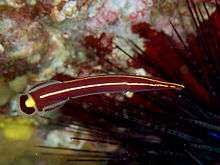Diademichthys lineatus
| Diademichthys lineatus | |
|---|---|
 | |
| Scientific classification | |
| Kingdom: | Animalia |
| Phylum: | Chordata |
| Class: | Actinopterygii |
| Order: | Gobiesociformes |
| Family: | Gobiesocidae |
| Genus: | Diademichthys Pfaff, 1942 |
| Species: | D. lineatus |
| Binomial name | |
| Diademichthys lineatus | |
Diademichthys lineatus, known commonly as the long-snout clingfish or urchin clingfish, is a species of marine fish in the family Gobiesocidae.[2]
Description
Long-snout clingfish is a small size fish, it grows up to 5 centimetres (2.0 in).[3]
Its body is elongated with a stretched and spatulate snout. This fact is a criterion for recognizing the sex of the fish, females having a longer and finer snout than males. This sexual dimorphism reflects a different diet between the two sex.[4]
The body background colour varies from dark brown to red-brown, three yellowish longitudinal lines runs along the body, one on the top and the two others on the median axis of the sides of the fish. The caudal fin is marked in its centre by a yellow spot, the snout can also have some yellow.
Distribution and habitat
Long-snout clingfish is widespread throughout the tropical waters of the Indo-West Pacific region from the Gulf of Oman to Papua New Guinea.[5]
It is found in reef environments often associated with long-spined sea urchins particularly of the genus Diadema.[4]
Alimentation
Long-snout clingfish feeds mainly on burrowing bivalves in corals, tube feet of their host and eggs of a commensal shrimp.[4] The sexual dimorphism is caused by a difference between male and female diet, so the adult female, having a longer snout, eats more often small bivalves and shrimp's eggs than the adult male, which eat more frequently tube feet.[4]
References
- ↑ Diademichthys lineatus (Sauvage, 1883) WoRMS
- ↑ Common names of Diademichthys lineatus Fishbase
- ↑ Randall, J.E., G.R. Allen and R.C. Steene, 1990. Fishes of the Great Barrier Reef and Coral Sea. University of Hawaii Press, Honolulu, Hawaii. 506 p.
- 1 2 3 4 Sakashita, Hiroko (1992). "Sexual dimorphism and food habits of the clingfish, Diademichthys lineatus, and its dependence on host sea urchin". Environmental Biology of Fishes. 34 (1): 95–101. doi:10.1007/BF00004787.
- ↑ Lieske & Myers,Coral reef fishes,Princeton University Press, 2009, ISBN 9780691089959
| Wikimedia Commons has media related to Diademichthys lineatus. |